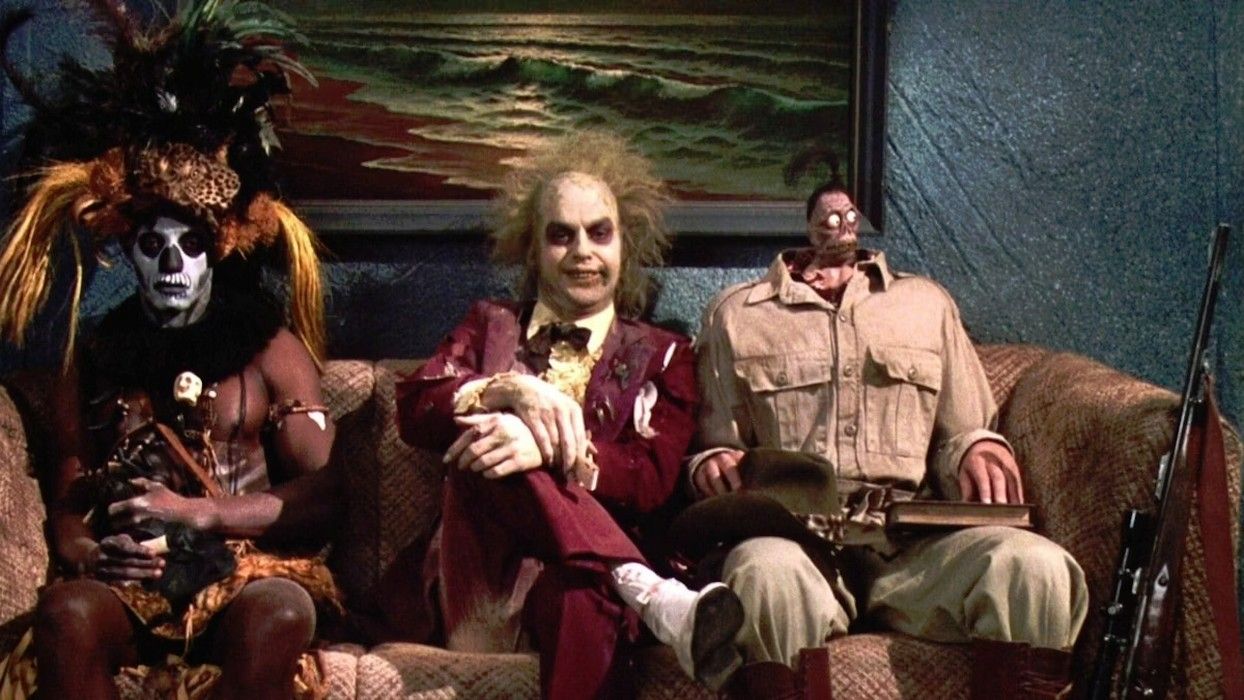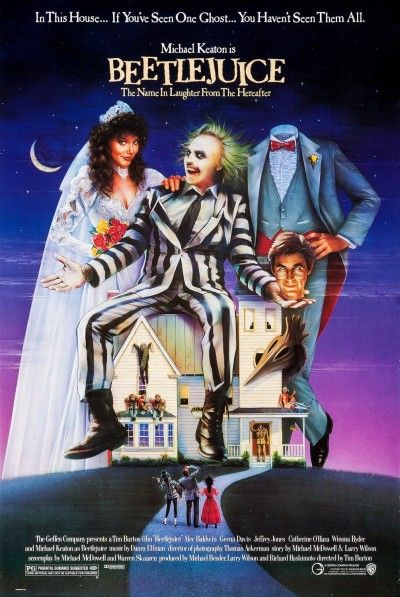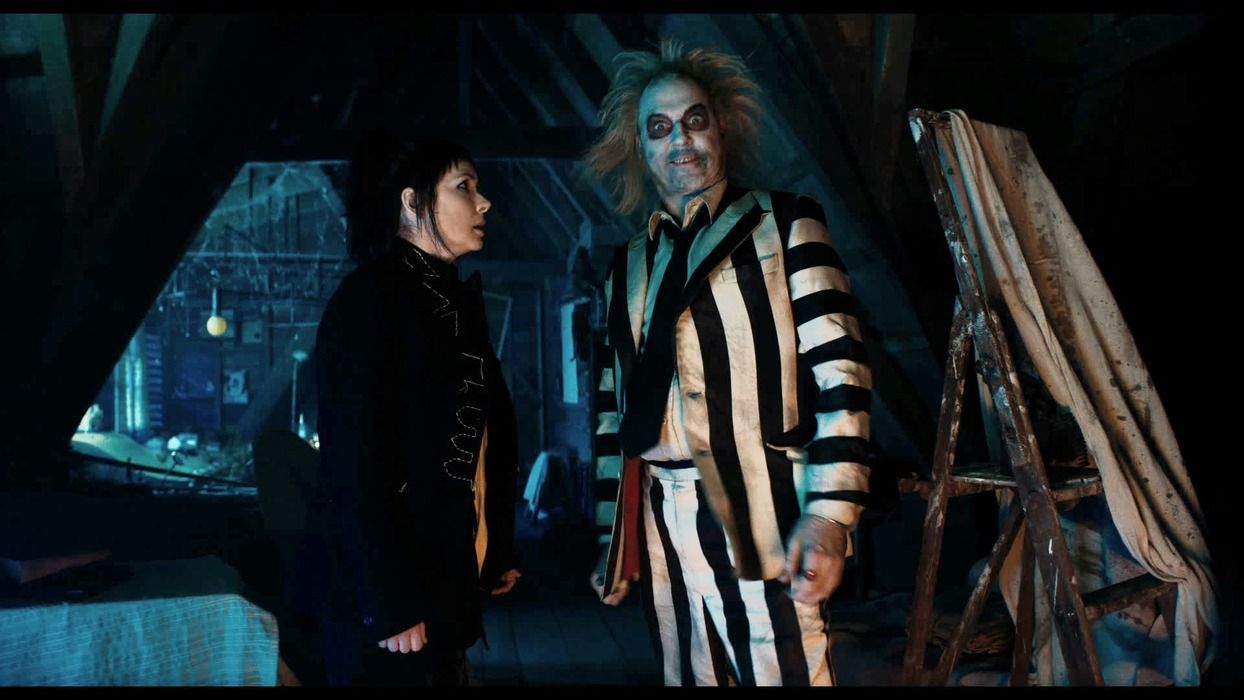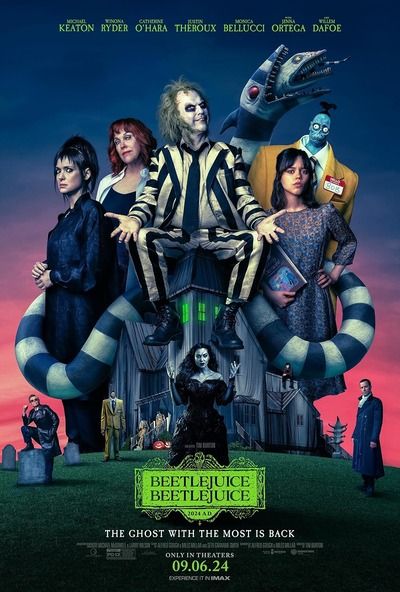
Beetlejuice (1988)
Rating: B
Dir: Tim Burton
Star: Michael Keaton, Geena Davis, Alec Baldwin, Winona Ryder
Rewatching this for the first time in what feels like forever, what stood out was how little the title character (and let’s not get into the whole spelling thing, please!) is on-screen. All told, barely seventeen minutes, but the impression he makes is undeniable. Weirdly, who Beetlejuice (Keaton) reminds me of more than anyone else, could be Ruby Rhod from The Fifth Element. Both are immensely irritating characters, of whom a little goes a very long way. Yet that’s kinda the point, and you absolutely will remember them. As we career towards the election, I’m also tempted to see a metaphor for the current American political situation, where… No. Let’s not go there. No good can come of it.
Instead, let’s focus on this being the film which broke Tim Burton. While not his first feature, it’s the one where his style really blossomed, and you can see many elements which would become staples of his work. I mean, if Ryder isn’t “Helena Bonham-Carter didn’t return my calls,” I don’t know what to say. Visually it’s the same sense of hyperrealism, despite depicting things far beyond the boundaries of reality, painting everything as if it were a candy-coloured nightmare. It’s one of the things elevating what could easily have become a fairly generic “ghosts try to scare away the living” story, especially with the kinda bland performances of Davis and Baldwin as the Maitlands, the late couple in question.
 Yet, they probably need to be, operating as straight men to the grandstanding favoured by just about every other character. Certainly not just Beetlejuice, with Lydia Deetz (Ryder) loudly proclaiming, “My whole life is a dark room,” or Catherine O’Hara as Delia: “If you don’t let me gut out this house and make it my own, I will go insane, and I will take you with me!” It’s all very performative performance: I’m not sure I’d want to spend much longer than ninety minutes with any of them. Under the circumstances, hard to blame the Maitlands for taking the nuclear option and loosing the ‘juice, despite the clear risk of the cure being worse than the disease.
Yet, they probably need to be, operating as straight men to the grandstanding favoured by just about every other character. Certainly not just Beetlejuice, with Lydia Deetz (Ryder) loudly proclaiming, “My whole life is a dark room,” or Catherine O’Hara as Delia: “If you don’t let me gut out this house and make it my own, I will go insane, and I will take you with me!” It’s all very performative performance: I’m not sure I’d want to spend much longer than ninety minutes with any of them. Under the circumstances, hard to blame the Maitlands for taking the nuclear option and loosing the ‘juice, despite the clear risk of the cure being worse than the disease.
It’s a delight to watch pure, unfettered imagination pouring out on the screen, whether or not it’s strictly relevant to the story. The depiction of the afterlife as a hellish, convoluted bureaucracy is such genius, it deserves further exploration, and could have sustained an entire movie; here, it’s just one element. However, in the end it’s Keaton’s film, and it’s now impossible to think of anyone else in the role – least of all, perhaps, Burton’s original choice of Sammy Davis Jr. There’s a chaotic intensity to the portrayal of a character who is almost as much antihero as villain, but there’s no denying, the film finds a new gear (arguably, several) whenever he pops up. Not every eighties fantasy film has survived the test of time: I’d say, this one definitely has.

Beetlejuice Beetlejuice (2024)
Rating: C-
Dir: Tim Burton
Star: Winona Ryder, Jenna Ortega, Michael Keaton, Catherine O’Hara
I supposed credit is due for not rushing into a quick cash-in. Thirty-six years have elapsed since the original movie, with every character in it now older and wiser. Well, the women are. Beetlejuice (Keaton) is still somewhat the same unrepentant jackass he was – more on that later – and Charles Deetz got his head bitten off by a shark, presumably due to actor Jeffrey Jones engaging in behaviour even Beetlejuice couldn’t condone. Daughter Lydia (Ryder) is now a famous psychic, much to the disgust of her daughter, Astrid (Ortega), who is rebelling by being a sceptic. However, all is not well in the spirit world, with Beetlejuice’s ex-wife, Delores (Timmy’s girlfriend Monica Bellucci) having reassembled her dismembered body parts, and is now out for revenge.
There’s also a bunch of other stuff, and to be honest, that’s more a problem than a bonus. Lydia being courted by her sleazy manager (Justin Theroux). A romantic interest for Astrid, who may or may not be what he seems. Actor turned ghost detective Wolf Jackson (Willem Dafoe). Astrid’s estranged father, who died on an Amazonian expedition. One of the strengths of the original was its relative simplicity, and that’s not a label which anyone would apply to the sequel. It definitely seems to be riding on the strength of its predecessor. Burton may have been ground down by the studio system. This could largely have been directed by anyone possessing a working familiarity with its predecessor, and Keaton’s performance lacks the sense of danger and edge from the original.
 Maybe it’s just a different era. First time around, Beetlejuice was panting after Lydia: with Ryder fifteen at the time of shooting, that would no longer fly. So he’s still after Lydia, only she’s now in her fifties. In general, Beetlejuice feels like an “Is Diet Pepsi alright?” version of the character: he’s not the main villain, that role being filled by Delores. I’m speculating (not having seen it), but wonder if this iteration might be more informed by the toned-down approach taken in the cartoon series. The show was certainly one factor in giving the character a sustained longevity in pop culture, which its original success might not necessarily have justified.
Maybe it’s just a different era. First time around, Beetlejuice was panting after Lydia: with Ryder fifteen at the time of shooting, that would no longer fly. So he’s still after Lydia, only she’s now in her fifties. In general, Beetlejuice feels like an “Is Diet Pepsi alright?” version of the character: he’s not the main villain, that role being filled by Delores. I’m speculating (not having seen it), but wonder if this iteration might be more informed by the toned-down approach taken in the cartoon series. The show was certainly one factor in giving the character a sustained longevity in pop culture, which its original success might not necessarily have justified.
There are still elements to enjoy, not least stellar use of MacArthur Park, likely the equal of the original’s use of The Banana Boat Song. However, parts of it resemble an unmade episode of Wednesday, and Ryder is now clearly occupying the “Helena Bonham-Carter stopped taking my calls” spot in Burton’s Rolodex. O’Hara as Delia Deetz might be the best thing the film has to offer, and I’d rather have seem more of Delia and the sadly underused Delores, with less of Lydia and Astrid. It’s all rather too overstuffed for its own good. Like a number of recent sequels, such as Ghostbusters: Frozen Empire, this comes across more as an exercise in nostalgia, than a story needing to be told.
